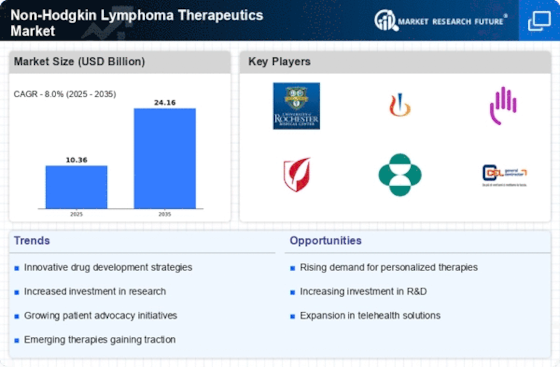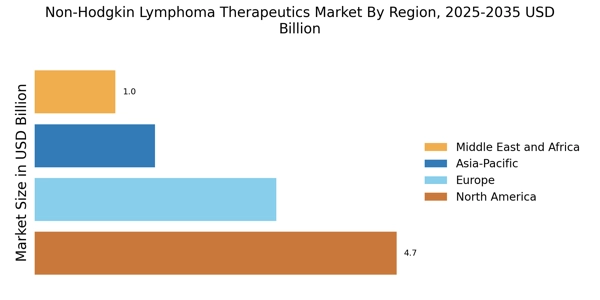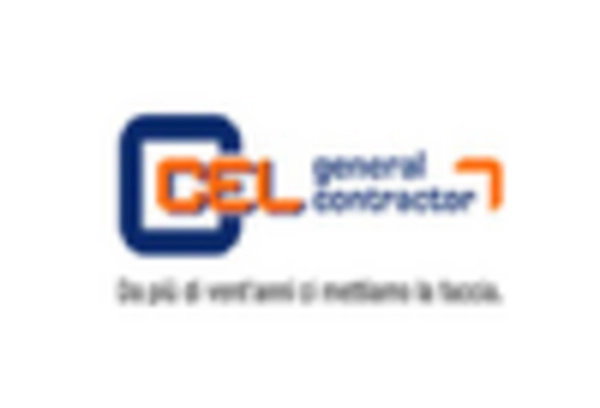Rising Awareness and Education
Rising awareness and education regarding Non-Hodgkin Lymphoma are crucial drivers for the Non-Hodgkin Lymphoma Therapeutics Market. Increased efforts by healthcare organizations and advocacy groups to educate the public about NHL symptoms, risk factors, and treatment options are leading to earlier diagnosis and intervention. This heightened awareness is fostering a more informed patient population that actively seeks out therapeutic options. Additionally, educational initiatives aimed at healthcare professionals are improving the overall understanding of NHL, which is essential for timely and effective treatment. As more individuals become aware of NHL and its implications, the demand for effective therapeutics is likely to rise, thereby propelling market growth. This trend indicates a shift towards proactive healthcare management in the context of NHL.
Advancements in Drug Development
Advancements in drug development technologies are transforming the Non-Hodgkin Lymphoma Therapeutics Market. The introduction of novel agents, including monoclonal antibodies and small molecule inhibitors, has revolutionized treatment protocols. For instance, the approval of CAR T-cell therapies has demonstrated remarkable efficacy in treating certain subtypes of NHL, leading to improved patient outcomes. The market for NHL therapeutics is projected to reach approximately USD 20 billion by 2026, driven by these innovative therapies. Furthermore, the integration of artificial intelligence and machine learning in drug discovery processes is expediting the identification of potential therapeutic candidates. This technological evolution not only enhances the speed of drug development but also increases the likelihood of successful outcomes, thereby fostering growth in the NHL therapeutics sector.
Growing Investment in Oncology Research
The growing investment in oncology research is a significant catalyst for the Non-Hodgkin Lymphoma Therapeutics Market. Governments and private entities are allocating substantial funds to explore novel treatment modalities for various cancers, including NHL. In recent years, funding for cancer research has seen a marked increase, with billions of dollars directed towards understanding the biology of NHL and developing targeted therapies. This influx of capital is facilitating clinical trials and accelerating the approval process for new drugs. As a result, the therapeutic options available for NHL patients are expanding, which is likely to enhance treatment outcomes and improve survival rates. The commitment to advancing oncology research underscores the importance of addressing the unmet medical needs within the NHL therapeutics landscape.
Regulatory Support for Innovative Therapies
Regulatory support for innovative therapies is a vital driver for the Non-Hodgkin Lymphoma Therapeutics Market. Regulatory agencies are increasingly recognizing the need for expedited approval processes for breakthrough therapies that demonstrate significant clinical benefits. Initiatives such as the FDA's Breakthrough Therapy Designation are designed to facilitate the development and review of promising treatments for NHL. This supportive regulatory environment encourages pharmaceutical companies to invest in research and development, knowing that their innovative therapies may receive faster market access. As a result, the therapeutic landscape for NHL is evolving rapidly, with new treatments entering the market at an unprecedented pace. This regulatory momentum is likely to enhance patient access to cutting-edge therapies, ultimately improving outcomes for those affected by NHL.
Increasing Incidence of Non-Hodgkin Lymphoma
The rising incidence of Non-Hodgkin Lymphoma (NHL) is a pivotal driver for the Non-Hodgkin Lymphoma Therapeutics Market. Recent statistics indicate that the prevalence of NHL has been steadily increasing, with an estimated 80,000 new cases diagnosed annually. This surge in cases necessitates the development and availability of effective therapeutic options. As the population ages, the risk of developing NHL escalates, further amplifying the demand for innovative treatments. The growing awareness of NHL among healthcare professionals and patients also contributes to early diagnosis and treatment, thereby expanding the market. Consequently, pharmaceutical companies are investing significantly in research and development to address this increasing need, which is likely to enhance the therapeutic landscape for NHL.


















